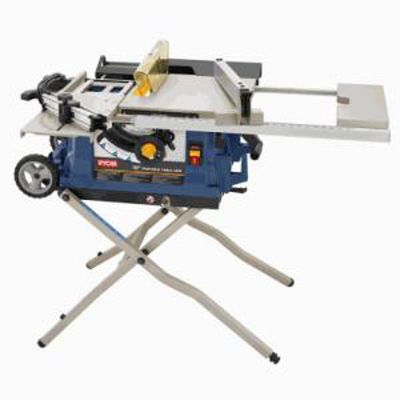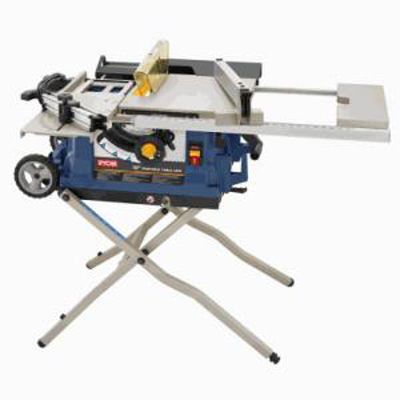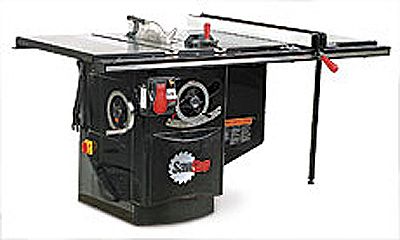
By Tom McKenna
I just read an article on the Boston Globe’s Web site about a guy in Malden, Mass., who was awarded $1.5 million in damages in a suit against One World Technologies, Inc., makers of Ryobi tools.
According to the complaint filed in 2006, Carlos Osorio suffered serious finger injuries using a tablesaw while cutting some oak flooring. The suit alleged that One World was negligent because its saws lack “flesh-detection technology,” which the plaintiffs claim would have prevented Osorio’s injuries. The device, invented by Steve Gass and manufactured by SawStop, stops a sawblade in an instant when it makes contact with skin. The safety feature was pitched to major saw manufacturers by Gass, but according to SawStop, licensing negotiations broke down and no agreements were reached. In the end, Gass and his colleagues, David Fanning and David Fulmer, launched the SawStop line of tablesaws on their own.
According to the story, this case is one of more than 50 suits pending throughout the U.S. against tablesaw manufacturers for failure to include the flesh-detection technology in their products.
Now that riving knives finally are mainstream on American-made tablesaws, could SawStop’s technology be far behind?
Fine Homebuilding Recommended Products
Fine Homebuilding receives a commission for items purchased through links on this site, including Amazon Associates and other affiliate advertising programs.

Reliable Crimp Connectors

8067 All-Weather Flashing Tape

Handy Heat Gun

























View Comments
The litigation lottery has no limits. With all due respect to the plaintiff and his injuries this case strikes me as another absurd example of common sense gone lost.
I find it pretty surprising that the plaintiff won this case. Ryobi is to be held accountable for not having a privately licensed safety system, which they didn't have rights to use, on their saws? it just seems like a bit of a stretch to me.
That really is stupefying... especially considering we're talking Ryobi here. I mean, even ignoring personal responsibility for ones actions, how is Ryobi any more at fault for not investing in sawstop technology (paying to license the tech, paying to retool production etc.) than the plaintiff would be for, well... not doing the exact same thing!
Sawstop does make a portable contractor saw. If the plaintiff was not going to pay more money for it and it's safety feature why the hell would Ryobi (a brand who's business model seems centred around selling lower priced tools) be expected to?
It seems as though the tool companies see the liability suits as the lesser of two evils. Re-designing, re-tooling, and the sawstop license all add a lot of expenses to overhead that probably far exceed the money paid out to the Land of the Nine-fingered. I knew a self-employed carpenter who ran his hand through a Makita portable one day. In addition to his medical bills (no health insurance, natch), he lost about a month of work, and with the help of a lawyer, went after Makita. He argued that the saw design was flawed because he was able to remove the blade guard, thereby injuring himself. He won the case. That's really screwed up.
Here's a tip from a Seattle school shop. The aluminum bar of a biesmeyer fence is conductive enough to trip a saw stop circuit. So will a plastic panel. This cost a lot of bucks to discover given the number of saws we have in several school shops. It's a good feature to have especially around kids but it's not perfect and neither is any saw in the hands of a careles idividual. Working when tired, removing safety devices or inatention are the responsibility of only the user. It's too bad that the lawyers have so much to say about it. Manufacturers have done a pretty good job of trying to make them safe and consumer groups have lead them the way. Reporting flaws by users works very well too. Not the greedy money sucking part of society.
I just wanted to clarify something that Briandotca mentioned in a comment, below. Ryobi offers a contractor's saw, but it's not a portable saw in the common sense of the word. To be clear, it does not have a collapsible stand, and is not meant to be transported from job to job.
...and now I want to clarify what I just wrote...I meant to say SAWSTOP has no true portable saw. Ryobi does. Sorry for the confusion, and even more sorry that our blogs don't have a "delete" button!
It ain't over 'til the fat lady sings. I'm sure there will be appeals.
Here's a link to an Inc Magazine story about the development of the Sawstop mechanism, the attempts to license the
technology to the industry and the industries reaction:
http://www.inc.com/magazine/20050701/disruptor-gass_printer_friendly.html
The article is a bit long and biased toward the Sawstop inventors/entrepreneurs (who are also patent attorneys !!), but is worth reading.
One thing that bugs me about this situation is that a Sawstop saw costs around $3000, but is made in Taiwan. I don't mind Taiwan-made products and my own tablesaw is a Grizzly Taiwan-made 3 hp cabinet unit that I'm very happy with. But the price differential seems pretty high just for the Sawstop gizmo.
I also wonder how often the mechanisms has "false" triggerings, and what it costs to replace the mechanism if that is then necessary when you get a false "bang" out of it.
I took a Woodcraft course recently and they had an extra Sawstop mechanism at the saw, and I doubt it was because they figured someone would cut off a finger - I think it was in case of a false triggering putting the saw out of action. This suggests to me that it could become really expensive to operate one of these saws over time, if, as the industry claims, the Sawstop mechanism has too many false triggers.
For myself, I work kind of like Norm Abram. No blade guard & no riving knife. But I do use a splitter and a push stick always. I feel relatively safe because I can see both the whirring blade and my fingers at the same time. Hope I'm right.
BTW, the Woodcraft people said they think that this mechanism will become mandatory at some time in the future, like riving knives are now.
It's sad in todays society that no one will take the blame for their wrong doing.Everyone else is to blame for our problems I'm a cabinet maker and in the few shops that I've worked in you would be lucky to find guards on the table saws. I don't know the situtation with this person except that there are no accidents on a table saw. This goof got his limbs to close to the blade no excuse for stupidity only the blame game.Sorry for his loss we'll all pay for this mans stupidity one way or another
It's sad in todays society that no one will take the blame for their wrong doing.Everyone else is to blame for our problems I'm a cabinet maker and in the few shops that I've worked in you would be lucky to find guards on the table saws. I don't know the situtation with this person except that there are no accidents on a table saw. This goof got his limbs to close to the blade no excuse for stupidity only the blame game.Sorry for his loss we'll all pay for this mans stupidity one way or another
Question ? Who plugged in the table saw ? who turned on the table saw ? Hello ! The Idiot who cut his fingers off . How about the attorney handling the case ? you know the answer.Geese , i wonder how that Idiot is with a hammer. Bingo, Case closed, General Building Contractor 40 years worth.
When I read the in depth article about this incident and how it was quite obvious that the injured person was doing about every thing wrong that you can do with a saw like this I find it crazy that he was awarded the verdict in his favor. I certainly hope that the saw manufacturer appeals this case and gets the verdict reversed. You should not be using any tool until you fully understand it and then use every safety device possible. I hope this case does not have a detrimental impact on all of us woodworkers.
I wouldn't trust people with a hammer if everyone could simply sue the manufacturer for smacking a thumbnail. Just because you CAN win a stupid case like this doesn't mean it's right.
SawStop (or any of their competitors) simply want to profit from legislating the required use of a product. This is blatantly unethical and unconstitutional.